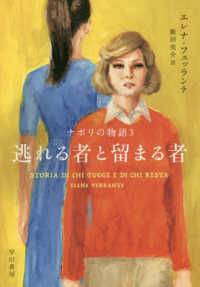- ホーム
- > 洋書
- > 英文書
- > Literary Criticism
Full Description
This 2004 volume offers an introduction to British literature that challenges the traditional divide between eighteenth-century and Romantic studies. Contributors explore the development of literary genres and modes through a period of rapid change. They show how literature was shaped by historical factors including the development of the book trade, the rise of literary criticism and the expansion of commercial society and empire. The first part of the volume focuses on broad themes including taste and aesthetics, national identity and empire, and key cultural trends such as sensibility and the gothic. The second part pays close attention to the work of individual writers including Sterne, Blake, Barbauld and Austen, and to the role of literary schools such as the Lake and Cockney schools. The wide scope of the collection, juxtaposing canonical authors with those now gaining new attention from scholars, makes it essential reading for students of eighteenth-century literature and Romanticism.
Contents
List of illustrations; List of contributors; Preface; Part I. Contexts and Modes: 1. Readers, writers, critics, and the professionalization of literature Barbara M. Benedict; 2. Criticism, taste, aesthetics Simon Jarvis; 3. Literature and politics Michael Scrivener; 4. Literature, national identity, and empire Saree Makdisi; 5. Sensibility Susan Manning; 6. Theatrical culture Gillian Russell; 7. Gothic James Watt; Part II. Writers, Circles, Traditions: 8. Richardson, Henry Fielding, and Sarah Fielding Peter Sabor; 9. Johnson, Boswell, and their circle Murray Pittock; 10. Sterne and Romantic autobiography Thomas Keymer; 11. Blake and the poetics of enthusiasm Jon Mee; 12. 'Unsex'd Females': Barbauld, Robinson, and Smith Judith Pascoe; 13. The Lake school: Wordsworth and Coleridge Paul Magnuson; 14. Jane Austen and the invention of the serious modern novel Kathryn Sutherland; 15. Keats, Shelley, Byron, and the Hunt circle Greg Kucich; 16. John Clare and the traditions of labouring-class verse John Goodridge and Bridget Keegan.





